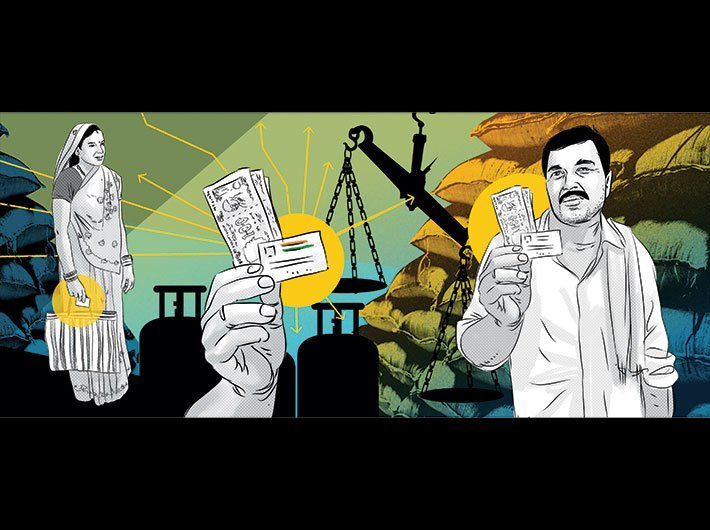There is a need to create a coordinating mechanism among various departments involved in the implementation of NFSA in a state
In April this year, activists dealing with food security wanted to know from people in Katar village in Rajasthan’s Bhilwara district whether the information uploaded on a website where PDS has been linked to Aadhaar was correct.
As the online information was displayed in a big screen in the village, people were surprised to see their actual entitlements.
One villager said, “Hey this is my name, but I am not getting my monthly ration that is mentioned here. The dealer is giving me ration in alternative months. How is it possible? My entitlement is linked to Aadhaar!” Other villagers also reacted similarly.
Further enquiry revealed that the dealer was manipulating the system. Though he gives the wheat in alternative month, kerosene is given on a monthly basis to the ration cardholders. While taking the fingerprint for kerosene every month in the POS (Point of Sale) machine, he also takes the same for the wheat without the knowledge of the card holder!
He may take the fingerprint in the machine as many times as he wants just by saying that the impression could not be read. When the embezzlement was exposed, the villagers demanded their quota of wheat back, forcing two dealers to distribute seven truck-loads of wheat to the people.
The lesson: the system with Aadhaar in place is manipulable.
The dealers were not giving any receipt against the distributed entitlements. They also did not mention the amount in the ration card and sign it. And people believed that Aadhaar prevents their entitlement from being siphoned off.
In a workshop organized by the Right to Food campaign in Delhi in July last week, social workers from various states discussed the performance of the scheme on the ground. A major concern was of course the mandatory use of Aadhaar in many states. There are instances where an old person having Aadhaar is not getting his quota of rice and wheat, as his fingerprints just do not match.
“Under the Aadhaar system, the old, the migrants and the children are more likely to be excluded andall of them belong to the most vulnerable groups,” says Shankar Singh of Mazdoor Kisan Shakti Sangathan (MKSS), Rajasthan.
Aadhaar is not much of an issue in Bihar or in West Bengal. But the Bihar government is roping in private companies to do the social audit, which will defeat the very purpose of audit. Ideally the villagers themselves should do the social audits, shared a social worker from Bihar.
The labourers of the tea gardens in West Bengal, where malnutrition is high, are receiving bad quality flour in place of wheat. In Uttar Pradesh, all the PDS cards had photograph of former chief minister on it. Now the photo of the new chief minister Yogi Adityanath is there. It has not affected people getting their entitlements.
In a series of visits made by the volunteers of right to food campaign to the ration shops in Delhi, it was found that nearly 60 percent shops are closed and information on the display board about the beneficiary details was not updated.
In Jharkhand, in some cases the fingerprint is taken for both sugar and wheat, but only wheat is given. In Gujarat, there is visible lack of awareness among the members of the village level vigilance committee about their role. Aadhaar is mandatory in Gujarat.
A set of recommendations was given by the campaign. There is an issue with the internal grievance redressal mechanism, which needs to be sorted out. In most cases, the comprehensive rule under NFSA has not been formulated. There is need of creating a coordinating mechanism among various departments involved in the implementation of NFSA in a state.

